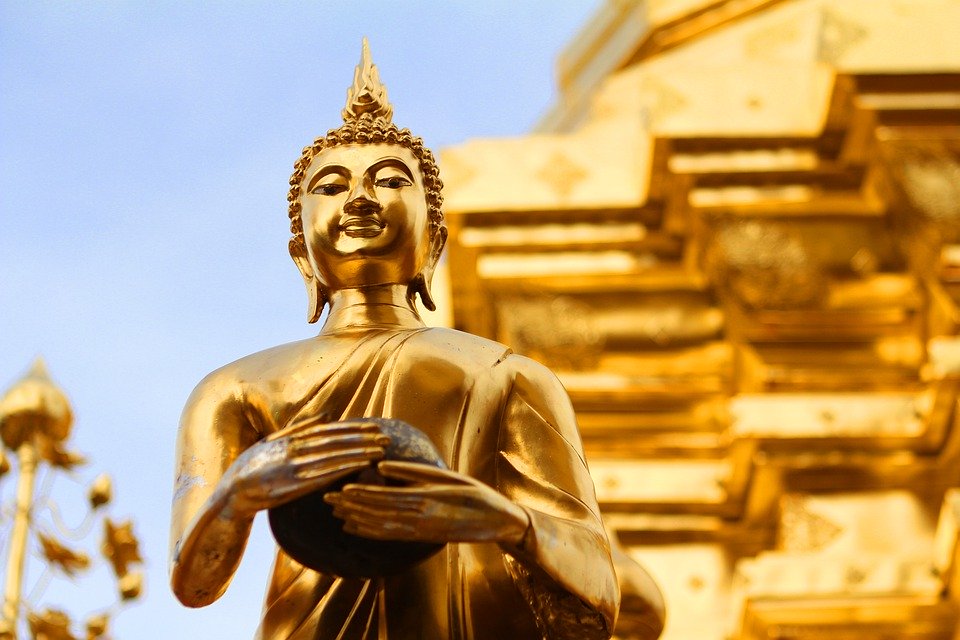In the history of Indian religions, Buddhism occupies a unique place, first, for throwing open its portals not only to the Indians of all strata of the society but also to the foreigners like the Greeks, Persians, Romans and nomadic groups of West Asia. It has made indelible marks in the history of countries like China, Nepal, Tibet, Burma, Sri Lanka, and the Indonesian countries. It was through the spread of Buddhism that the cultural heritage of India was shared by most of the Asians.
Historical Background and Circumstances of the time of the Buddha
1) Turmoil in the Society
The sixth century B.C was a time of turmoil, of political and social transformations in India. It was during this period that Mahavira (599 B.C-527 B.C) founded Jainism while Gautama Buddha (560 B.C- 480 B.C) propounded Buddhism.
2) Decayed Hinduism
The decay of Hinduism at this time was the main reason for the rise of Buddhism and Jainism. The Hindu society had lost its former glory and many kinds of abuses and superstitions had crept into Hinduism oppressing the people to the core. People were forced into great troubles which were unbearable. They had been waiting for an opportunity to break away from the yoke of Vedic burden.
3) The cruelty of the Caste System
Society was torn and tortured in the name of the caste system. The higher caste people justified cruelty over the lower castes as the Law of Karma. Caste curtailed every attempt of the lower castes and justified every cruelty of the upper caste.
4) Brahmin Domination
The Brahmins had the monopoly in the field of religion and with the Mantras, which was a privilege on to their caste, they could torture others unscrupulously. They encouraged superstitions and tried to exploit as much as they could. It was believed that their Mantra could bring victory to any move and so they became the masters of every situation controlling even gods. They boasted themselves the chosen people of God and others were the cursed creations of Karma.
5) Religion was a Bundle of Superstitions and Blind Beliefs
Mantras and Sanskrit formulas controlled the religion and religion was only a bundle of superstitions that could not bring any solace to the sufferings of the people.
6) Education was allowed Only to the Brahmins
Education was beyond the reach of the lower castes. Hence people other than the Brahmins had to grope in ignorance without education. They could not find solutions for their sufferings which they were made to believe we’re the result of their Karma.
7) People Bleeding with Blind Rituals and Sacrifices
People were forced to perform rituals and sacrifices which cost a lot and were luxury feasts for the Brahmins who had religion in their hold. A lot of animals were killed in the name of rituals and sacrifices.
 This caused aversion towards religion and they longed for an alternative that could free them. Every household had to perform rituals and sacrifices to appease the gods as compelled by the priests, though they were an unbearable burden to them.
This caused aversion towards religion and they longed for an alternative that could free them. Every household had to perform rituals and sacrifices to appease the gods as compelled by the priests, though they were an unbearable burden to them.
8) Corruption Predominated in everything
Corruption played a dominating role in the hands of the Brahmins. The Kshatriyas and the Vaishyas, considered next to the Brahmin caste, also detested the supremacy of the Brahmins. Even the King of the country had to depend upon the mercy of the Brahmin priests.
9) Economy and political Systems Shattered
Because of the corruption and oppression of the caste system, the economy and the political system were also low.
10) Hinduism Became an Incomprehensible Burden
Hinduism which had lofty ideas and ideals became an incomprehensible burden to people. They were waiting for a Messiah to free them from these unreasonable burdens. It was at this time that Buddha was born at the foot of Himalayas and set out to preach his doctrine of love and equality.
In the above circumstances, a change in religion was necessary for the time of Buddha. In the words of Jawaharlal Nehru, the late Prime Minister of India, Buddha had the courage to attack popular religions, superstition, ceremonial, and priestcraft, and all the vested interests that clung to them. And so was born Buddhism.





